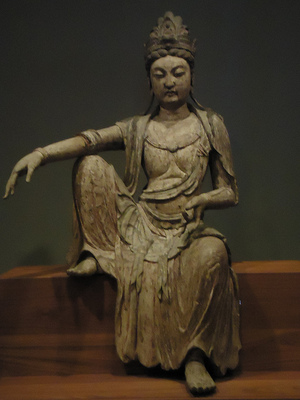Difference between revisions of "Xi Xia"
(Created page with "*''Dates: 1038-1211'' *''Chinese'': 西夏 ''(Xī Xià)'' The Western Xia, or Xi Xia, was a Tangut state controlling parts of Inner Mongolia and northwestern [[Ch...") |
|||
| (3 intermediate revisions by the same user not shown) | |||
| Line 1: | Line 1: | ||
| + | [[File:Haa-guanyin.jpg|right|thumb|320px|A [[Northern Song Dynasty]] or Xi Xia statue of [[Kannon|Guanyin]], Honolulu Museum of Art]] | ||
*''Dates: [[1038]]-[[1211]]'' | *''Dates: [[1038]]-[[1211]]'' | ||
| − | *''Chinese'': | + | *''Chinese'': 西[[夏]] ''(Xī Xià)'' |
The Western Xia, or Xi Xia, was a [[Tangut]] state controlling parts of Inner Mongolia and northwestern [[China proper]] in the 11th to early 13th centuries. Its territory was located to the west of the [[Khitan]] [[Liao Dynasty]], the northwest of the Chinese [[Song Dynasty]], and north of [[Tibet]]. Though not known for balancing Sinification and nomadic steppe traditions as successfully as the Liao, Xi Xia is still known for its exquisite Buddhist sculpture. | The Western Xia, or Xi Xia, was a [[Tangut]] state controlling parts of Inner Mongolia and northwestern [[China proper]] in the 11th to early 13th centuries. Its territory was located to the west of the [[Khitan]] [[Liao Dynasty]], the northwest of the Chinese [[Song Dynasty]], and north of [[Tibet]]. Though not known for balancing Sinification and nomadic steppe traditions as successfully as the Liao, Xi Xia is still known for its exquisite Buddhist sculpture. | ||
| − | Xi Xia invaded Song territory in [[Shanxi province]] in the year of its founding, in [[1038]], beginning a war with the Song which was to last until [[1044]]. During this time, the Song developed improved crossbows, gunpowder weapons, catapults, shields, and other projectile weapons. Eventually, the two sides achieved an agreement, by which the Song paid [[tribute]] to the Tanguts in exchange for peace, as the Song simultaneously did with the Khitans. | + | Xi Xia invaded Song territory in [[Shanxi province]] in the year of its founding, in [[1038]], beginning a war with the Song which was to last until [[1044]]. During this time, the Song developed improved crossbows, [[gunpowder]] weapons, catapults, shields, and other projectile weapons. Eventually, the two sides achieved an agreement, by which the Song paid [[tribute]] to the Tanguts in exchange for peace, as the Song simultaneously did with the Khitans. |
| − | War with the Song broke out again in [[1080]]-[[1081]], and the Xi Xia continued to pose a threat to the Song until its fall to [[Mongol]] forces in [[ | + | War with the Song broke out again in [[1080]]-[[1081]], and the Xi Xia continued to pose a threat to the Song until its fall to [[Mongol]] forces in [[1227]]. |
{{stub}} | {{stub}} | ||
Latest revision as of 01:06, 18 August 2020
The Western Xia, or Xi Xia, was a Tangut state controlling parts of Inner Mongolia and northwestern China proper in the 11th to early 13th centuries. Its territory was located to the west of the Khitan Liao Dynasty, the northwest of the Chinese Song Dynasty, and north of Tibet. Though not known for balancing Sinification and nomadic steppe traditions as successfully as the Liao, Xi Xia is still known for its exquisite Buddhist sculpture.
Xi Xia invaded Song territory in Shanxi province in the year of its founding, in 1038, beginning a war with the Song which was to last until 1044. During this time, the Song developed improved crossbows, gunpowder weapons, catapults, shields, and other projectile weapons. Eventually, the two sides achieved an agreement, by which the Song paid tribute to the Tanguts in exchange for peace, as the Song simultaneously did with the Khitans.
War with the Song broke out again in 1080-1081, and the Xi Xia continued to pose a threat to the Song until its fall to Mongol forces in 1227.
References
- Conrad Schirokauer, et al, A Brief History of Chinese and Japanese Civilizations, Fourth Edition, Cengage Learning (2012), 194.
